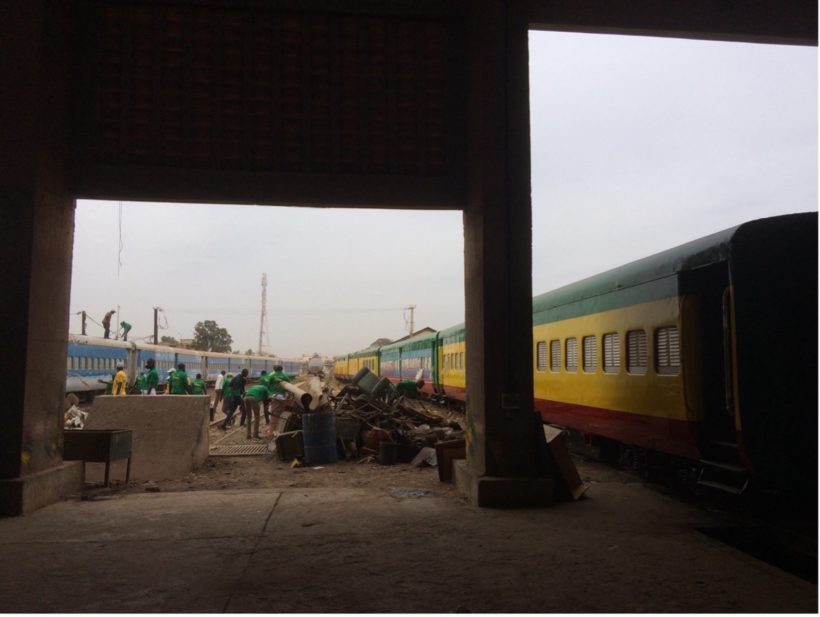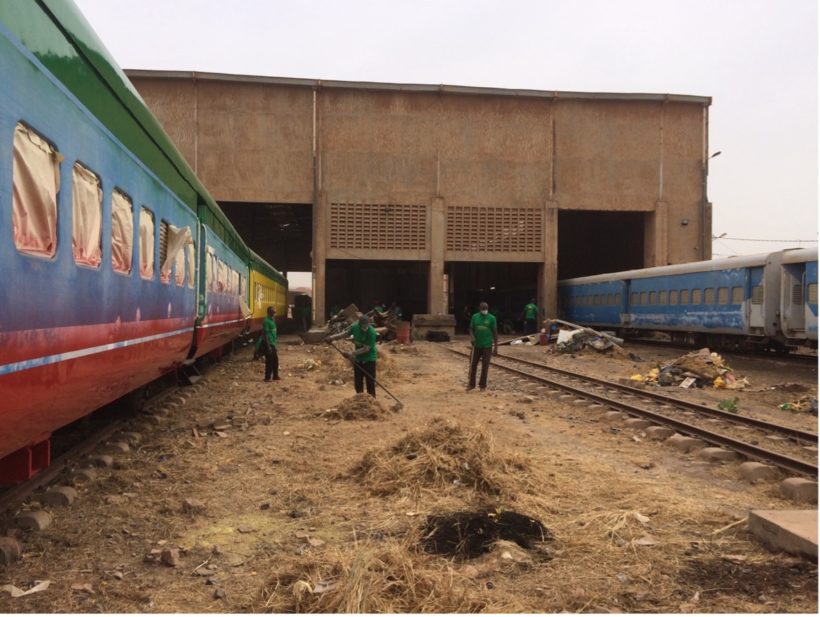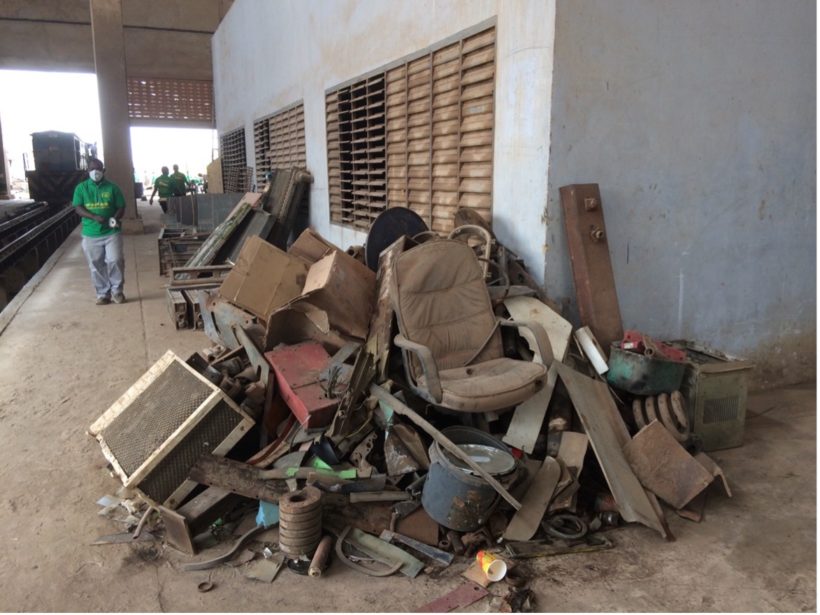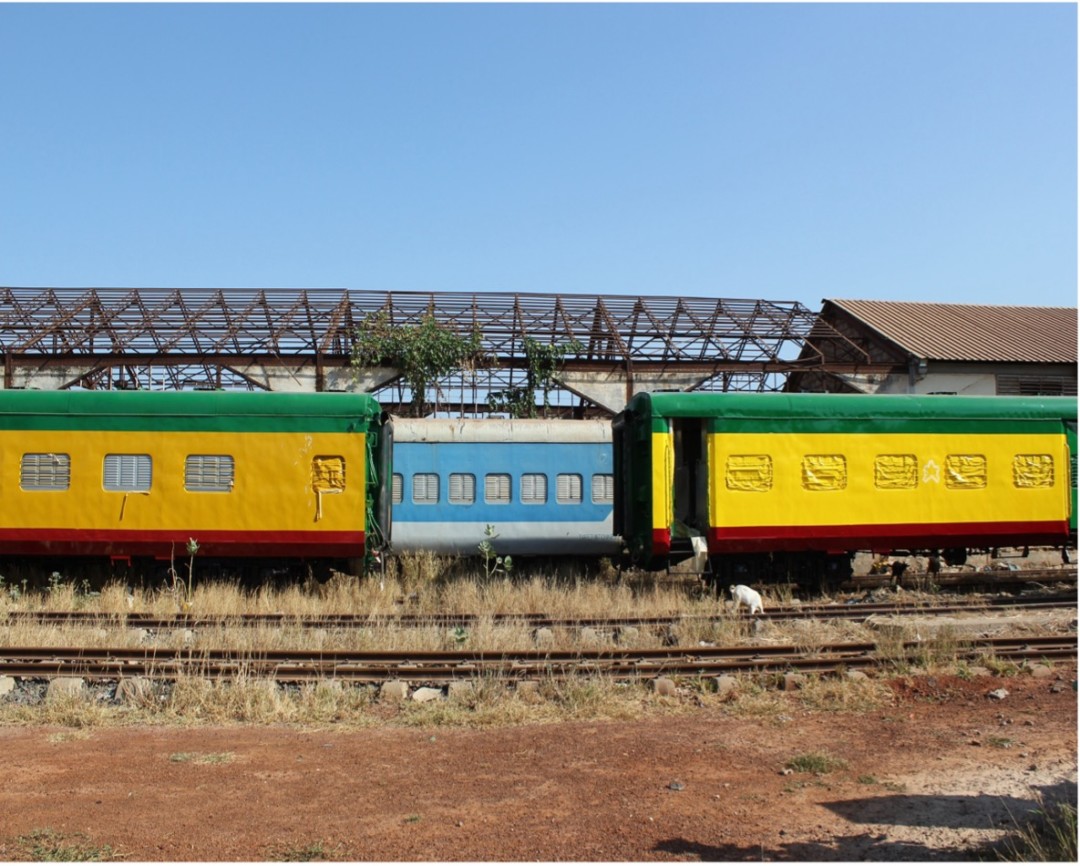In January 2020, the Senegalese President Macky Sall announced a nation-wide ‘Cleaning Day’. Together with a ‘Zero waste’ campaign and followed by monthly ‘Cleaning Days’, he invited citizens to contribute to the de-cluttering and cleaning of public spaces. The employees of the suburban train service called Petit Train de Banlieue would form an integral part of the cleaning campaign. Their national train service usually brought commuters from the capital Dakar to the suburbs and the neighbouring city Thiès. Since 2019, however, the trains had been suspended due to the construction of a new Express train and their salaries regularly postponed. Even though the trains had ceased to run, the railway management always found new and, according to the workers, senseless tasks to occupy them with. ‘This is absurd’, remarked Cheikh, one of the railway workers, when they were told to repaint the old dysfunctional trains. They were not able to engage in the actual repairs that the train needed as the budget did not suffice. ‘Why are we supposed to repaint the outer shell, when the inner body doesn’t work?’ Cheikh asked. And yet, they meticulously engaged in the repainting of the wagons using the colours of the Senegalese flag – green, yellow, and red with a green star in the middle. When they were done, the workers were told that they had used the incorrect shade of yellow. A couple of months later, the colours of the flag were deemed wrong all together. It was too bright and looked unsophisticated – not serious enough for a national railway line according to the management. This time, the workers were asked to use grey and a muted green colour. They were furious, frustrated and ‘demoralised’ (Rajković 2018), but continued with these pointless chores.
At the same time, I propose that the workers’ engagement in the very practices they called absurd testified to multiple layers of critique.
Homing in on the railway workers’ Cleaning Day – as another task that they would refer to as useless -, I suggest that these absurd assignments were used to keep the workers busy as their service was slowly discontinued. At the same time, I propose that the workers’ engagement in the very practices they called absurd testified to multiple layers of critique. “Cleaning” has a rich history in Senegal and has been mobilised for critique from various angles. I show how it moves between a public stance by the government directed to a global, environmental-friendly audience; an imposition by the authorities on its civil servants and citizens; to a morally-laden and civilising discourse by the railway management. In doing so, it coopts the history of an older youth movement called Set Setal which used cleaning as a critique against authorities (Poleykett 2021), and most importantly here, crystallises the workers’ discontent and own shifting positions towards this cleaning action.

For the cleaning day, the employees of the little suburban railway in Rufisque, Senegal were given a full-day schedule and tasks for the following week. They were first told to clean their depot in Rufisque. A week later, they would join other governmental institutions to remove rubbish from the centre of Dakar between the place de l’indépendance (independence square) and the central railway station. The latter had been a thorn in the railway workers’ side since the suburban trains were neither allowed to depart from nor enter the main station in Dakar anymore. It was being refurbished for the new regional express train, which was going to replace their suburban one, and thereby also probably render them jobless.
Senegal was not the first country to establish such a cleaning routine, which historically has also carried strong connotations of political violence in colonial regimes and dictatorships.
Senegal was not the first country to establish such a cleaning routine, which historically has also carried strong connotations of political violence in colonial regimes and dictatorships.[1] Internationally, clean-up and environmental campaigns have recently proliferated across the world, calling for volunteers to clean beaches, for example, whether in the Arctic or on the West African coast. While such initiatives testify to an increasing awareness of pollution and environmental degradation, sometimes instigated by environmental activists themselves (see Modou Fall, the Plastic Man), they have also become a way for heads of state to position themselves and their nation as environmentally, educationally and safety friendly. As a contemporary comparative case, the announced Senegalese cleaning routines resembled the President of Rwanda’s day of community cleaning called Umuganda, and Nigeria’s Environmental Sanitation Day (Manton 2013), both scheduled on the last Saturday of every month.
Yet, the cleaning movement had also a longer history in Senegal which was erased in the newly launched Cleaning Days: the well-established Set Setal narrative and popular ecology movement meaning ‘Clean and be clean’ in Wolof, had been initiated by young people as a response to the contested elections in Dakar in 1988 and in protest against political corruption and the insalubrious state of many places in Dakar (Poleykett 2021). The Set Setal members started cleaning their neighbourhoods and spraying political messages on the wall to ‘clean’, purify and improve sanitary conditions, but also political norms (Benga 2001; Fredericks 2018; Diouf 1992). This more popular and ‘subaltern’ history was however largely coopted in the context of Macky Sall’s social and economic programme of ‘emergence’ (Plan Sénégal emergent) that aims to increase annual per capita growth (Poleykett 2021).

Cleaning in the railway depot of Rufisque took on another layer, becoming a morally charged discourse about discipline and development directed towards the railway workers.
Cleaning in the railway depot of Rufisque took on another layer, becoming a morally charged discourse about discipline and development directed towards the railway workers. The manager of the suburban railway, a lawyer by trade, was quickly surrounded by cameras and employees when he arrived at the depot. Standing in the middle of the crowd of workers, the freshly painted wagons and accompanied by the employees from the hygiene service of the Ministry of Health and Social Action, he started his speech by welcoming everyone and introducing what he thought were the fundamental values of the Cleaning Days:
‘Look around us, especially at the Western countries: They have values. They get up early, they work hard and they clean up their surroundings. I think that whatever we want to do, it only makes sense if good working conditions, hygiene, and mutual respect are guaranteed… things have to change, it’s not acceptable that people during working hours are chatting and making tea. We have to work. You have to impose working hours on yourselves. We have to be models of correctness… Once again, lets congratulate the president whose Plan Emergent is putting Senegal on the irreversible path of development.’
In his value-laden address, cleanliness became a marker of progress, civilisation and growth compared with an imagined ‘western world’ and that the Plan Senegal Emergent was striving towards. Clean spaces, but also clean workers, represented for the manager European values of modernity and honourable work, which contrasted with the image he painted of his personnel: he pictured the PTB staff and their workspace as unclean, uncivilised and unhygienic, thereby also socially and economically backward.
While not directly apparent after the speech, the workers gradually became more annoyed as the day passed. Initially meeting the initiative with enthusiasm, the workers had formed groups and allocated different tasks. Equipped only with some brooms, and a couple of masks for some, the workers of the PTB had started by picking up rubbish all over the depot’s premises and cleaning the inside of the wagons. This included almost dismantling the inside of the wagons, taking out the seats and disassembling the ventilation system to remove the dust and dirt that had settled and built up over time. Others were marching along the tracks and picking up litter from underneath and next to the trains, until piles of rubbish accumulated throughout the depot and outside. Here, the discontent became louder, and the workers’ initial eagerness was overshadowed by the speech that had been deemed disrespectful; it was further tainted by the tediousness of the activity and lack of cleaning gear. In the workers’ eyes, this was emblematic of their general situation. Fatou, the only woman working in the depot and responsible for refuelling the trains, complained:
‘It’s like that always. They talk about cleaning days and then they come along without shovels, rakes or gloves, and we have to do all of this with our bare hands. And it doesn’t make sense to clean these wagons if we don’t use them.’

Old electrical litter was thrown on a pile with weeds that had been pulled out, and then burnt together. Fatou was shaking her head. She didn’t come to the depot often now, a couple of times a week. The rest of the week she was at another station. But the trains did not need much fuel, in fact no fuel as they were not regularly – almost never – running.
Some groups of workers picking up the rubbish had fallen silent, visibly tired of the strenuous activities. Here, condemning the senseless cleaning of the trains led to a larger critique of the national cleaning discourse, their working situation but also the racialised discourse of the manager: ‘Are we only here to clean up the rubbish? And then, they criticise us for not working? But what are we supposed to do if the train service is always interrupted and doesn’t work?’ Another one added: ‘This dream of émergence is all well and fine, but we are not part of it.’ How could they even be given a chance to do their work correctly and safely when the most basic tools and resources were missing? Fatou had asked. In their protestations, the difficult circumstances, and conflicting emotions highlighted their daily predicament: ‘We are told we have to clean but we don’t have the means to do it well. It doesn’t make sense. It’s always the same thing.’
This feeling of being tasked with useless cleaning chores that do not contribute to the actual improvement of the railway system, was accompanied by frustration and a sense of absurdity.
This feeling of being tasked with useless cleaning chores that do not contribute to the actual improvement of the railway system, was accompanied by frustration and a sense of absurdity. Here, the linking of individual responsibility, the moral image of a good citizen and a clean worker, stood in stark contrast to the lack of resources that the workers had to clean their workplace and the trains with, also hurting their dignity. The workers’ shifting attitudes towards the initially enthusiastic engagement in cleaning that they had gradually become disillusioned with – along with the shifting meaning of cleaning itself – gestures to how ‘cleaning’ and the discussions around it can be mobilised from different vantage points as critique. It sheds light on the longer genealogies of protest against politics in Senegal, but also expresses here locally the workers’ sense of exclusion and of being treated as less worthy.
Notes
[1] Across colonial and postcolonial countries, sanitation and cleaning practices were used in the context of colonial zoning programmes, fast urban expansion in postcolonial times, and amidst the drastic cut of public services from the 1980s onwards, see for example Bigon (2016); Manton (2013). For an example on how discourses on cleanliness are used in dictatorships and specifically in the context of trains, see for example the case of Chile under Pinochet: Tomic, Trumper, and Dattwyler, ‘Manufacturing Modernity: Cleaning, Dirt, and Neoliberalism in Chile’, 518–22.
Bibliography
Benga, Ndiouga Adrien. 2001. ‘Entre Jérusalem et Babylone : Jeunes et Espace Public à Dakar’: Autrepart n° 18 (2): 169–78.
Bonilla, Yarimar. 2020. ‘Postdisaster Futures: Hopeful Pessimism, Imperial Ruination, and La futura cuir’, Small Axe: A Caribbean Journal of Criticism, 24(2), pp. 147–162.
Bigon, Liora. 2016. French Colonial Dakar: The Morphogenesis of an African Regional Capital. Studies in Imperialism. Manchester: Manchester University Press.
Diouf, Mamadou. 1992. ‘Fresques Murales et Ecriture de l’histoire: Le Set/Setal a Dakar’. Politique Africaine 46: 41–54.
Fredericks, Rosalind. 2018. Garbage Citizenship: Vital Infrastructures of Labor in Dakar, Senegal. Durham: Duke University Press.
Hopkinson, Leo. 2022. Only one Mayweather: a critique of hope from the hopeful. Journal of the Royal Anthropological Institute 28(3): 725-745.
Manton, John. 2013. ‘“Environmental Akalism” and the War on Filth: The Personification Of Sanitation In Urban Nigeria’. Africa 83 (4): 606–22.
Poleykett, Branwyn. 2021. ‘A Broom to the Head: “Cleaning Day” and the Aesthetics of Emergence in Dakar’. Urban Studies, 16.
Rajković, Ivan. 2018. For an Anthropology of the Demoralized: State Pay, Mock-labour, and Unfreedom in a Serbian Firm. Journal of the Royal Anthropological Institute 24(1): 47-70.





